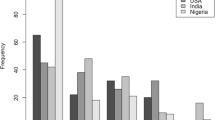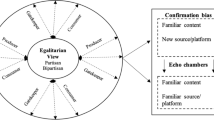Abstract
Reducing emissions from deforestation and degradation (REDD+) in tropical countries is an important and contested element of the post-Kyoto climate regime. For policy options which generate controversy between diverse actor groups, such as REDD+, mass media plays an important role in defining and supporting policy possibilities. Analysis of the way in which national media frames issues of climate change and deforestation can offer insights into the nature of the contested domains of the REDD+ policy process. Here, we examine the Brazilian national media discourses surrounding REDD+ because it contributes to setting the tone of policy debates at the federal level. Specifically, we ask the following: (i) How was REDD+ portrayed in the Brazilian national print media and whose opinions and perceptions were represented? and (ii) How have media frames on REDD+ in the national print media changed over time? Our results contribute with new knowledge for understanding the observed progress of REDD+ in Brazil. We identify two main themes that dominate the focus in the national media coverage of REDD+, specifically “politics and policymaking” (representing half the coverage) and “economics and market” (with over a third). Results show that discussions around carbon markets were amongst the most contested and that optimism in relation to REDD+ effectiveness declined over time. The analysis suggests that positions adopted on the national REDD+ strategy were shaped by state and federal collision of interests. We demonstrate an evolution of national concerns from an initial focus on efficiency (e.g. finance and carbon markets) to a recentred focus on equity issues (e.g. implementation of safeguards). We conclude with some thoughts on the implications of these features for REDD+ interventions and implementation in Brazil.
Similar content being viewed by others
Notes
Projeto incentiva desenvolvimento sustentável na Amazônia, O Estado de S. Paulo, 11 December 2009
Terras indígenas e reservas possuem 30% do carbono estocado na Amazônia, Valor Econômico, 5 September 2009
REDD+ divide Estados e União, O Estado de S. Paulo, 17 August 2009
References
Abranches SR (2014) The political economy of deforestation in Brazil and payment-for-performance finance. CGD Climate and Forest Paper Series. Center for Global Development, Washington DC
Anderson A (2009) Media, politics and climate change: towards a new research agenda. Sociol Compass 3:166–182
Assunção J, Gandour CC, Rocha R (2012) Deforestation slowdown in the legal Amazon: prices or policies? Rio de Janeiro: NAPC/PUC-Rio (CPI Technical Report). Available at: http://climatepolicyinitiative.org/riodejaneiro/files/2012/03/Deforestation-Prices-or-Policies-Working-Paper.pdf
Angelsen A, McNeill D (2012) The evolution of REDD+. In: Angelsen A, Brockhaus M, Sunderlin WD, Verchot LV (eds) Analysing REDD+: Challenges and Choices. Center for International Forestry Research, Bogor, pp 31–49
Boerner J, Wunder S (2008) Paying for avoided deforestation in the Brazilian Amazon: from cost assessment to scheme design. Int For Rev 10(3):496–511
Boykoff M (2007) From convergence to contention: United States mass media representations of anthropogenic climate science. Trans Inst Br Geogr 4(32):477–489
Boykoff MT (2008) The cultural politics of climate change discourse in UK tabloids. Polit Geogr 27:549–569
Brockhaus M, Di Gregorio M (2012) A brief overview: component 1 on national REDD+ policies and processes. CIFOR Infobrief 13, Center for International Forestry Research, Bogor, Indonesia
Brockhaus M, Korhonen-Kurki K, Sehring J, Di Gregorio M, Assembe-Mvondo S, Babon A, Bekele M, Gebara MF, Khatri DB, Kambire H, Kengoum F (2016) REDD+, transformational change and the promise of performance-based payments: a qualitative comparative analysis. Clim Pol 1–23
Carvalho FVD (2013) The Brazilian position on forests and climate change from 1997 to 2012: from veto to proposition. Rev Bras Polit Int 55(special edition):144–169
Cronin T, Santoso L, Di Gregorio M, Brockhaus M, Mardiah S, Muharrom E (2016) Moving consensus and managing expectations: media and REDD+ in Indonesia. Clim Chang 137:57–70
Crow AD (2010) Local media and experts: sources of environmental policy initiation? Policy Stud J 38(1)
De Sassi C, Sunderlin WD, Sills EO, Duchelle AE, Ravikumar A, Resosudarmo IAP, Luttrell C, Joseph S, Herold M, Kweka DL, Atmadja SS et al (2014) REDD+ on the ground: global insights from local contexts. In: Sills et al (eds) REDD+ on the ground: a case book of subnational initiatives across the globe. Center for International Forestry Research, Bogor
Dittmer J (2005) Captain America’s empire: reflections on identity, popular culture, and post-9/11 geopolitics. Ann Assoc Am Geogr 95:626–643
Dkamela G, Brockhaus M, Kengoum DF, Schure J, Assembe MS (2014) Lessons for REDD+ from Cameroon’s past forestry law reform: a political economy analysis. Ecol Soc 19(3):30
Di Gregorio M, Brockhaus M, Cronin T, Muharrom E (2012) Politics and power in national REDD + policy processes. In: Angelsen A, Brockhaus M, Sunderlin WD, Verchot LV (eds) Analysing REDD +: Challenges and Choices. Center for International Forestry Research, Bogor, pp 69–90
Eliasch J (2008) Climate change: financing global forests. The Eliasch review. Office of Climate Change, London
Fatorelli L, Gebara MF, May P, Zhang S, Di Gregorio M (2015) The REDD+ governance landscape and the challenge of coordination in Brazil. CIFOR infobrief no. 115. Available at: http://www.cifor.org/library/5508/the-redd-governance-landscape-and-the-challenge-of-coordination-in-brazil/
GCF – Governors’ Climate and Forests Task Force (2014) Proposal for allocation of “U-REDD” emissions reductions in Brazilian GCF member states/organized by Mariano C. Cenamo; Pedro G. Soares; Junia Karst. IDESAM, Manaus
Gebara MF, Thuault A (2013) GHG mitigation in Brazil’s land use sector: an introduction to the current national policy landscape. Working Paper. Washington, DC: World Resources Institute. Available at: http://wri.org/publication/ghg-mitigationbrazil-land-use-sector
Gebara M, Fatorelli L, May P, Zhang S (2014) REDD+ policy networks in Brazil: constraints and opportunities for successful policy making. Ecol Soc 19(3):53
Goffman E (1974) Frame analysis: an essay on the organization of experience. Harvard University Press, Cambridge
Gregersen H, Lakany HE, Karsenty A, White A (2010) Does the opportunity cost approach indicate the real cost of REDD+. Technical report, Rights and Resources Initiative, Washington, DC, US
Hochstetler K, Viola E (2012) Brazil and the politics of climate change: beyond the global commons. Environ Polit 21(5):753–771
Hochstetler K, Viola E (2015) Brazil. In: Bäckstrand K, Lövbrand E (eds) Research handbook on climate governance. Edward Elgar, Cheltenham
INPE (2016) Instituto Nacional de Pesquisa Espacial. Prodes project: monitoring the Brazilian Amazon forest by satellite. Available at: http://www.obt.inpe.br/prodes/index.php
Intergovernmental Panel on Climate Change (2007) Synthesis report summary for policymakers. Fourth assessment report. Cambridge University Press, Cambridge
Kennamer DJ (ed) (1992) Public opinion, the press, and public policy. Praeger, Westport
Khatri DB, Pham TT, Di Gregorio M, Karki R, Paudel NS, Brockhaus M, Bhushal R (2016) REDD+ politics in the media: a case from Nepal. Clim Chang 138:309–323
Korhonen-Kurki K, Sehring J, Brockhaus M, Di Gregorio M (2014) Enabling factors for establishing REDD+ in a context of weak governance. Clim Pol 14(2):167–186
Luttrell C, Loft L, Gebara MF, Kweka D, Brockhaus M, Angelsen A, Sunderlin WD (2013) Who should benefit from REDD+? Rationales and realities. Ecol Soc 18(4):52
May PH, Millikan B, Gebara MF (2011) The context of REDD+ in Brazil: drivers, agents, and institutions, 2nd edn. Center for International Forestry Research, Bogor
MMA – Ministério do Meio Ambiente (2012) Salvaguardas para REDD+. Nota Informativa n. 02. Secretaria de Mudanças Climáticas e Qualidade Ambiental, Ministério do Meio Ambiente, Brasília. Available at: http://redd.mma.gov.br/images/Publicacoes/mma_notainformativa_02.pdf
Mautner G (2008) Analysing newspapers, magazines and other print media. In: Wodak R, Krzyzanowski M (eds) Qualitative discourse analysis in the social sciences. Palgrave Macmillan, Basingstoke, pp 30–53
Nepstad D, Soares-Filho B, Merry F, Moutinho P, Rodrigues H, Bowman M, Schwartzman S (2007) The costs and benefits of reducing emissions from deforestation and degradation in the Brazilian Amazon. Woods Hole Research Center, Falmouth
ODI – Overseas Development Institute (2015) Subsidies to key commodities driving forest loss: implications for private climate finance, Overseas Development Institute. Available at: http://www.odi.org/sites/odi.org.uk/files/odi-assets/publications-opinion-files/9577.pdf
Paletz DL (1999) The media in American politics: contents and consequences. Longman, New York
Pham TT, Brockhaus M, Wong G, Dung LN, Tjajadi JS, Loft L, Luttrell C, Assembe Mvondo S (2013) Approaches to benefit sharing: a preliminary comparative analysis of 13 REDD+ countries. Working Paper 108. Center for International Forestry Research, Bogor, Indonesia
Plumb ST, Nielsen EA, Kim Y-S (2012) Challenges of opportunity cost analysis in planning REDD+: a Honduran case study of social and cultural values associated with indigenous forest uses. Forest 3:244–264
Rogers EM, Dearing JW (2007) Agenda-setting research: where has it been, where is it going? In: Graber DA (ed) Media power in politics. CQ, Washington, DC, pp 80–97
Stern N (2007) The economics of climate change: the stern review. Cambridge University Press, Cambridge
UNFCCC - United Nations Framework Convention on Climate Change (2010) Decision-1/CP.16, The Cancun Agreements. Available online at: http://unfccc.int/resource/docs/2010/cop16/eng/07a01.pdf
van der Hoff R, Rajão R, Leroy P, Boezeman D (2015) The parallel materialization of REDD+ implementation discourses in Brazil. Forest Policy Econ 55(C):37–45
Acknowledgements
This research is part of the policy component of the Global Comparative Study of REDD+ of the Center for International Forestry Research (CIFOR) (http://www.forestsclimatechange.org/globalcomparative-study-on-redd.html). We would like to thank Sergio Leite, Tiemi Kagohara, and Izaira Zineski for their contributions on managing the resources of this research. The methods applied in this study were built on research undertaken by the Comparing Climate Change Policy Networks program (http://compon.org). We also thank Stephan Price and Clare Saunders for sharing the Code Book for the Analysis of Media Frames in Climate Change Articles, which was adapted for the media analysis of national REDD+ policy.
Author information
Authors and Affiliations
Corresponding author
Rights and permissions
About this article
Cite this article
Gebara, M.F., May, P.H., Carmenta, R. et al. Framing REDD+ in the Brazilian national media: how discourses evolved amid global negotiation uncertainties. Climatic Change 141, 213–226 (2017). https://doi.org/10.1007/s10584-017-1896-1
Received:
Accepted:
Published:
Issue Date:
DOI: https://doi.org/10.1007/s10584-017-1896-1




